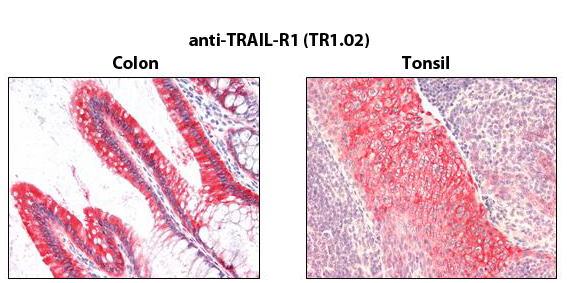
Immunohistochemistry detection of endogenous TRAIL-R1 in paraffin-embedded human carcinoma tissues (colon, tonsil) using mAb to TRAIL-R1 (TR1.02) (Prod. No. AG-20B-0027).
anti-TRAIL-R1 (human), mAb (TR1.02)
AG-20B-0027
ApplicationsFlow Cytometry, ImmunoHistoChemistry
Product group Antibodies
ReactivityHuman
TargetTNFRSF10A
Overview
- SupplierAdipoGen Life Sciences
- Product Nameanti-TRAIL-R1 (human), mAb (TR1.02)
- Delivery Days Customer10
- ApplicationsFlow Cytometry, ImmunoHistoChemistry
- CertificationResearch Use Only
- ClonalityMonoclonal
- Clone IDTR1.02
- Concentration1 mg/ml
- Estimated Purity>95%
- Gene ID8797
- Target nameTNFRSF10A
- Target descriptionTNF receptor superfamily member 10a
- Target synonymsAPO2, CD261, DR4, TRAILR-1, TRAILR1, tumor necrosis factor receptor superfamily member 10A, TNF-related apoptosis-inducing ligand receptor 1, TRAIL receptor 1, TRAIL-R1, cytotoxic TRAIL receptor, death receptor 4, tumor necrosis factor receptor superfamily, member 10a
- HostMouse
- IsotypeIgG2b
- Protein IDO00220
- Protein NameTumor necrosis factor receptor superfamily member 10A
- Scientific DescriptionMonoclonal Antibody. Recognizes human TRAIL-R1. Does not cross-react with human TRAIL-R2, -R3 or -R4. Isotype: Mouse IgG2b. Clone: TR1.02. Applications: FACS, IHC. Liquid. In PBS containing 10% glycerol and 0.02% sodium azide. TRAIL-R1 is a receptor for the cytotoxic ligand TRAIL. The adapter molecule FADD recruits caspase-8 to the activated receptor. The resulting death-inducing signaling complex (DISC) performs caspase-8 proteolytic activation which initiates the subsequent cascade of caspases (aspartate-specific cysteine proteases) mediating apoptosis. Promotes the activation of NF-kappaB. - TRAIL-R1 is a receptor for the cytotoxic ligand TRAIL. The adapter molecule FADD recruits caspase-8 to the activated receptor. The resulting death-inducing signaling complex (DISC) performs caspase-8 proteolytic activation which initiates the subsequent cascade of caspases (aspartate-specific cysteine proteases) mediating apoptosis. Promotes the activation of NF-kappaB.
- ReactivityHuman
- Storage Instruction-20°C,2°C to 8°C
- UNSPSC41116161




